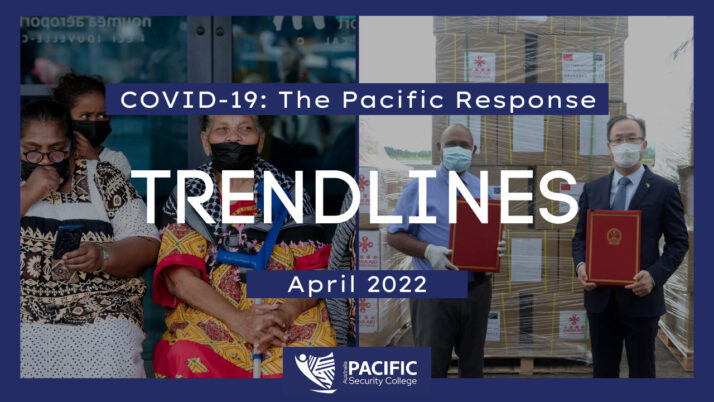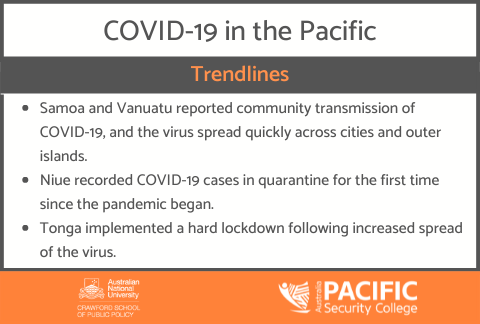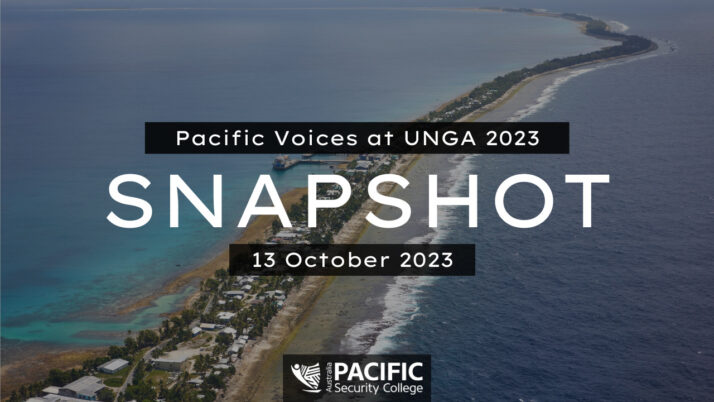COVID-19 – the Pacific response: April 2022

As the Pacific passes the two-year anniversary of COVID-19 in the region, the virus is continuing to have severe impacts on island nations.
It has been 24 months since the pandemic began in the Pacific. For many in the region, they are now living with the virus in their communities, as the Omicron variant has breached quarantine and border closure measures.
Here is a snapshot of policy responses to COVID-19 in the Pacific region, correct as of 12pm AEDT, 31 March 2022.

Policy responses
Following the discovery of COVID-19 within its borders, Samoa entered a level three lockdown on Saturday, 19 March. The first case was an American missionary who tested positive on the preceding Thursday. Concerningly, the individual caught COVID-19 long after arriving in the country, highlighting the existence of potentially weeks of silent community transmission.
There have now been over 1,500 reported cases in Samoa, predominantly on Upolu and Savai’i, with Manono-tai and Apolima-tai remaining COVID-19-free so far. Under the current restrictions, public gatherings, church services, and recreational activities such as sport and swimming have been banned.
Schools have been shut, whilst shops are open for limited products between 6am to 2pm. These restrictions will be in place until at least early April.
The Vanuatu Government was reportedly considering placing the country in a full lockdown, as COVID-19 continues to spread unchecked within Efate and other islands. The outbreak first began following a number of positive cases on repatriation flights. The first positive community case was confirmed at Vila Central Hospital on 4 March. The virus has quickly spread within the community, with a recording at least 3,128 cases since the beginning of 2022.
Vanuatu also reported its first COVID-19 deaths on Wednesday 30 March. The nation has been under Alert Level Three restrictions since 7 March and six provinces have been placed under a 6pm to 6am curfew. These measures have not slowed the virus to any meaningful degree, prompting the Health Ministry to consider further restrictions.
Tonga will ease lockdown restrictions on 2 April. Under the new rules, some businesses will be allowed to operate for three days a week. The country had reported 6,144 cases and six deaths, with 90 per cent of its target population being double vaccinated, and 49 per cent having received a booster shot.
Although Tonga eased lockdown restrictions in early March, the rapid spread of cases in Nuku’alofa and some outer islands prompted the reinstatement of a hard lockdown on the 20 March. All shops remain closed, with the public only able to visit hospitals or tend plantations.
Niue is no longer COVID-19-free, as the small island territory reported its first positive case since the pandemic began on 10 March. The individual in question arrived on a passenger flight from Auckland and was placed in quarantine, alongside 26 other passengers. The number of border cases swelled to six, amid reports that members of the public were ‘lingering’ around quarantine facilities.
Although it was their first case in two years, Niue has an high vaccination rate of 97 per cent, and had not announced any reversal of its planned international border reopening in April. Visitors arriving in the territory must show proof of a negative polymerase chain reaction (PCR) test 48 hours before departure, and take a supervised rapid antigen test on arrival.
Kiribati extended its curfew restrictions for another four weeks from 2 April, as community cases remain high in the country. Case numbers have ballooned to over 3,000, and there have been 13 deaths recorded. Authorities have warned of a potential second wave of infections occurring within the next month. Partial lockdown restrictions will continue, however the curfew on South Tarawa, Betio, Buota, and Butaritari has been reduced to between 8pm and 5am.
Cook Islands eased some lockdown and travel restrictions, as the focus of the health response shifted from prevention to mitigation. Following their first positive cases recorded in February, the country had recorded 1,745 cases, with no hospitalisations.
Despite the virus spread, Prime Minister Mark Brown removed a number of restrictions, including the 10-day stand-down period in New Zealand for those travelling to Rarotonga and the ban on unvaccinated residents arriving. The islands will also open to Australian tourists from 12 April, and the rest of the world in May.
As the pandemic enters its endemic phase, New Caledonia and French Polynesia have begun to ease some of the border and vaccination restrictions. Mandatory testing has been abolished for travellers entering Tahiti, whilst fully vaccinated visitors to New Caledonia will no longer have to isolate.
Papua New Guinea eased a number of COVID-19 restrictions on 21 March. Citizens will only need to have had two vaccination shots to be considered ‘fully vaccinated’, and people arriving in the country via boat will no longer require a negative test within 72 hours of arrival. People flying into the country will still need a negative PCR test 72 hours before departure, and must be fully vaccinated.
Briefly, American Samoa has recorded its second COVID-19 death with the island nation reporting over 2,500 community cases. Citizens in the Northern Mariana Islands are no longer required to wear masks indoors, and Fiji has removed its in-country isolation requirement for visitors arriving in the country. Finally, Guam is currently weighing up whether to end its public health emergency declaration, which was made at the start of the COVID-19 pandemic.
This article is part of the Pacific Security College (PSC)’s continued coverage of the COVID-19 pandemic in the Pacific. Click here to access PSC’s COVID-19 tracking map, which is updated weekly with the latest vaccination and case numbers across the region.
More Stories

Security Snapshot - 28 Mar 2024
Pacific Security Snapshot | 28 March 2024
Summary ➣ Heavy rains, floods, landslides and earthquakes batter the region ➣ Pacific submissions to the International Court of Justice (ICJ) on climate change responsibility ➣ Elections across the Pacific prompting changes to diplomatic relations and security arrangements ➣ Challenges for women in politics Climate Security Lives have been lost in PNG after a series…

Security Snapshot - 13 Oct 2023
Pacific Security Snapshot: Pacific voices at the United Nations
In this special edition of the Pacific Security Snapshot, we look at the key issues raised by Pacific leaders at the recent United Nations General Assembly, including climate change, reform to multilateral institutions and ocean health. “These challenges might be inconvenient for large economies – but I can assure the climate impacts already at our…






